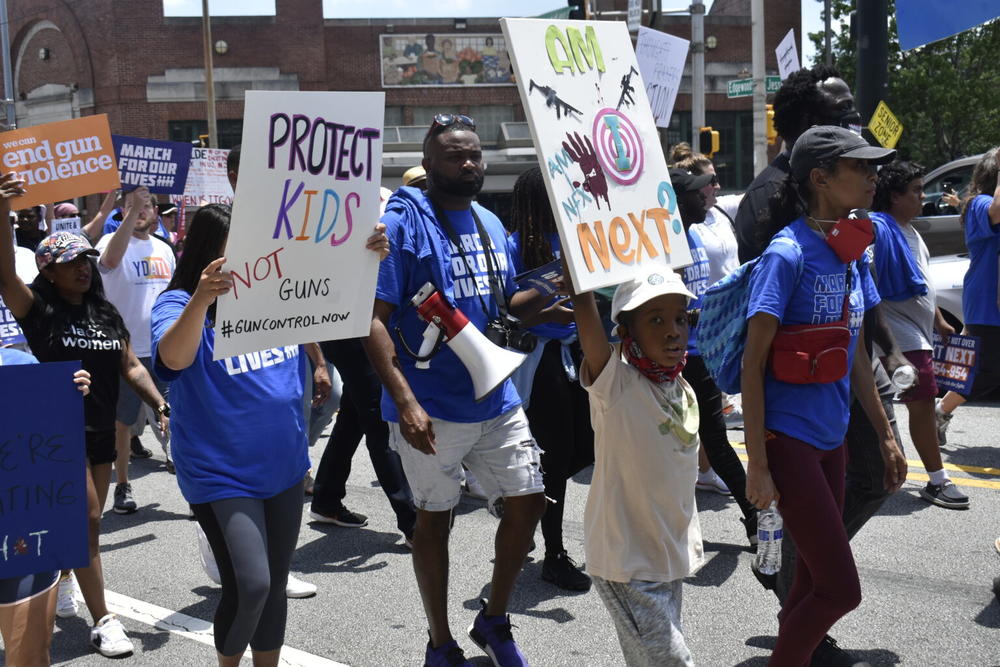
Caption
Students and adults marched through Atlanta June 11 to call for gun safety reforms.
Credit: Ross Williams/Georgia Recorder
|Updated: June 14, 2022 11:55 AM

Students and adults marched through Atlanta June 11 to call for gun safety reforms.
Chloe Lipton of Fulton County experienced her first active shooter drill when she was 9.
“They used like a code word I can still remember,” she said. “Over the intercom, they said, ‘The rock wall is closed, I repeat, the rock wall is closed.’ That’s what the key was for the teachers to do it. I can remember we were told to sit in the corner that was not seen from the door and be silent as possible. I don’t think I even realized how bad it could have gotten when I was that young, but as I got older and understood what was going on, there was definitely more fear.”
The most frightening experience for Lipton, who is now a college student, was when her class went on lockdown for two hours because of suspicious activity near the school.
“That was the longest it ever happened,” she said. “I can still remember going through my mind thinking, ‘Oh my gosh, what would I do?’ First, I would just, you know, tell all my friends, ‘Okay, we need to silence our phones.’ What if someone’s phone goes off and someone can hear that there are students in here? And I would think about who I would have to text. These are things that I had to think about as a student.”
Lipton, who studies at the University of Wisconsin, came to Atlanta over the weekend as part of a nationwide protest organized by March for Our Lives, a group organized by students in 2018 after the shooting at Marjory Stoneman Douglas High School in Parkland, Florida. The group is back in the street this month following the recent high-profile shootings in Buffalo and Uvalde.

Gun safety demonstration in Atlanta June 11, 2022.
Georgia State University student James Wilson of Newton County began volunteering with March for Our Lives as a high schooler after learning about the group on social media following the Parkland attack.
Like Lipton, Wilson grew up practicing for a mass shooting like older generations ran through fire drills.
“You start out fearing it, and then it just becomes normal,” he said. “You get to a point where you don’t feel anything anymore, you’re kind of numb to it. And that is the problem. The problem is that so many members of my generation, they have gotten numb to it. They think that this is what’s normal, they think this is what should be happening. And it shouldn’t. Gun violence is not something that we should ever get used to.”
March for Our Lives participants are calling for tougher gun safety measures, including a nationwide gun licensing system and a federal ban on assault-style firearms, as well as proposals they say will address the root causes of gun violence, like ending the war on drugs and redirecting federal funds from jails and police to community-based safety programs.
Polling suggests that more Americans are open to government action to control gun violence. An NPR/PBS NewsHour/Marist poll conducted in the wake of the Buffalo and Uvalde shootings found the proportion of American adults who say it is more important to control gun violence than to protect gun rights is at its highest point in nearly a decade, 59% to 35%, with 6% unsure. The proportion was 54% to 39% the month after Parkland, NPR reports.
The shift in public opinion seemed to be apparent in the faces of those who marched Saturday from Ebenezer Baptist Church to Woodruff Park in Atlanta, Wilson said.
“If you look at the crowd, you see a lot of older adults, 60, 70, we have people in their 80s,” he said. “We had a lady come up to me and ask me where is the shuttle for the disabled and the elderly, and we didn’t even realize that they wanted to show up.”
“It wasn’t that way when they were growing up, and they want it to end,” he added. “They’re tired of seeing senseless violence happen to children who are going to school to make friends and learn.”
But changes to gun laws in Georgia have tended to go in the opposite direction of what Saturday’s marchers would like to see. Residents across much of Georgia value firearms and view government attempts to limit access as invitations to tyranny.
In April, Republican Gov. Brian Kemp signed a so-called constitutional carry bill ending the permit requirement for those seeking to carry a handgun in public in Georgia. Later that month, the National Rifle Association endorsed Kemp against his then-rival, former Republican U.S. Sen. David Perdue.
Following the Uvalde shooting, Kemp released details of his administration’s efforts to secure Georgia schools, efforts Democrats are keen to point out do not mention guns.
“It’s not surprising that Brian Kemp’s so-called school safety plan doesn’t mention guns because his own failed record includes pointing a gun at a teenager and making it easier for criminals to carry hidden guns,” said Democratic Governors Association deputy communications director Sam Newton, referencing the permitless carry bill and an infamous 2018 ad. “It’s time for Kemp to explain why he’s all-in on a dangerous agenda that makes Georgians less safe.”
Kemp has stressed efforts to secure schools, such as mandatory safety plans and threat level analyses performed by the Georgia Emergency Management Agency and Homeland Security. The results of those efforts are not available to the public for security and privacy reasons, according to GEMA.
“GEMA/HS decided not to create a scorecard or audit report so that schools feel comfortable to freely participate in these exercises,” according to the agency’s open records officer. “Doing so allows the schools to focus on the true goal of the audits, identifying and eradicating any potential security flaws. If the Homeland Security Division created audit records, there is a realistic fear schools would rather not participate than face the potential security implications of those records getting into the wrong hands or the negative public response and scrutiny unfavorable results could evoke.”
Gaby Dancause, a rising senior from Cobb County who attended the Atlanta march, said she’s heard arguments that the focus should be on hardening schools rather than restricting guns, but she doesn’t buy it.

Part of the crowd gathered in Atlanta’s Woodruff Park June 11, 2022.
“It’s a different kind of issue. Instead of working on security, we need to work on the gun crisis and get that easy access out of people’s hands,” she said.
“I feel like security shouldn’t be pushed aside though,” said Dancause’s friend, fellow Cobb senior Eibhy Dwelley.
Dwelley said her father has been trying to contact her school over security concerns there.
“I feel like there’s no way for us to prepare against mass weapons of destruction, there’s no way we can prepare against an AK-47,” she said. “Either ways, it’s a dangerous weapon that shouldn’t even be in the building.”
Kai McAlvin, a recent high school graduate from Cobb, said they’ve heard calls for increased security before, and they’re not confident it will make much difference.
“They tried to make an effort like right after Parkland, there was a lot of extra security in my school, but it kind of died down and they seemed to not care about it anymore,” McAlvin said. “I hope that will change, but I really don’t think so. Knowing our country and where we’re at right now, I don’t have any hope at this point.”
This story comes to GPB through a reporting partnership with Georgia Recorder.